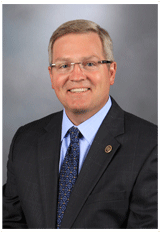Higher education has become not just critical, but almost necessary in today’s job market. College graduates age 25 and above earn nearly twice as much as workers with a high school diploma. The median earnings gap between those who attended a four-year college versus a high school diploma is nearly double. Community colleges and technical schools also play a pivotal role, equipping students with applicable skills for high-quality jobs upon graduation.
The legislature has made a concerted, sustained effort to invest in students and institutions, all toward the same goal: To help individuals reach their full potential in order to create a skilled workforce. As a state, it is important to make accessing higher education easier for allcitizens in order to create an opportunity to seek new career paths, or advance in current professions.
The Midwestern Higher Education Compact (MHEC) was created with this aim in mind. Established in the early 1990s, the compact has strived for almost 25 years to stress the importance of postsecondary education programs. The group is an interstate, regional effort, comprised of 12 member states.
Its mission is to promote higher education, encourage student access, increase academic cooperation among states, and embrace innovative educational services in a technology driven world. Missouri has been a member of this group since nearly its formation, and it’s been my honor to serve on MHEC’s steering committee, this year as vice-chairman for Missouri’s delegation.
This week, it was my pleasure to host the Executive Director, and others from MHEC in Jefferson City to discuss the role Missouri plays in the compact, and the ways our state benefits from membership. In Fiscal Year 2014 alone, the state saved $7.3 million through our partnership with MHEC, including $2.4 million in cost savings by purchasing much-needed technology hardware and software, and through the Midwest Student Exchange Program.
The group’s impact goes beyond fiscal savings. Over the last two decades, this compact has supported states’ efforts to strengthen their higher education systems, expand access to more students and lend valuable guidance as governments and higher-education institutions embrace new, innovative measures.
I’ve always believed that as states, we have to cooperate and collaborate with one another. It benefits all of us when more people seek higher education, particularly in a world connected by technology. This is an endeavor that requires us to work together, as lawmakers, as advocates of higher education, and as state governments. Our goal is to ensure 60 percent of Missourians obtain some sort of post-secondary education by 2025, and guarantee the superior preparation and performance of every child in school and life.
In this age, people move more fluidly from one state to another, especially in search of job opportunities. We need to make sure that wherever those citizens go, they are equipped with the post-secondary skills that will allow them to become a valuable member of the workforce. MHEC plays a crucial role in ensuring this, and our state is well served by remaining an active, vocal member of this group. Again, it was a privilege to host representatives from MHEC at the Capitol.
As always, please feel free to contact me or my staff with any questions or concerns at any time. We look forward to hearing your comments and suggestions and trying to answer any questions you may have. You can reach us by phone at 866-277-0882 (toll-free) or (573) 751-2272, or by fax at (573) 526-7381.
Senator David Pearce serves Caldwell, Carroll, Howard, Johnson, Lafayette, Livingston, Ray and Saline counties in the 21st State Senatorial District.
|



